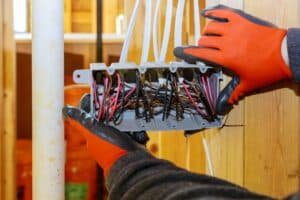The Neat Heat trial is a new project aimed at transforming how we heat homes in the UK. Led by UK Power Networks, OVO, and tepeo, this trial explores how millions of UK homes can switch to low-carbon electric heating using heat battery technology.
Key Players: UK Power Networks, OVO, and tepeo
UK Power Networks, OVO, and tepeo are the main groups behind the Neat Heat trial. Each brings unique skills and resources to help develop and implement this new heating solution.
Objectives of the Neat Heat Trial
The primary goals of the Neat Heat trial are to reduce carbon emissions, alleviate stress on the electricity grid, and help the UK meet its net-zero targets by 2050. By testing heat battery technology, the trial aims to offer a superior alternative to traditional heating methods.
The Need for Change in Home Heating
Current State of Home Heating in the UK
Most UK homes still rely on fossil fuel-based heating systems, which significantly contribute to greenhouse gas emissions. This dependence on outdated heating methods makes it challenging to achieve the country’s environmental goals.
Environmental Impact of Traditional Heating Methods
Traditional heating methods, such as gas boilers, release substantial amounts of carbon dioxide and other pollutants into the atmosphere. This not only accelerates climate change but also deteriorates air quality and public health.
The UK’s Net-Zero Targets for 2050
The UK has set ambitious goals to achieve net-zero carbon emissions by 2050. Transitioning to low-carbon heating solutions is a crucial part of this plan since home heating accounts for a large portion of the country’s total emissions.
Innovative Heat Battery Technology
How Heat Batteries Work
Heat batteries store thermal energy, which can later be used to heat homes. This technology enhances electricity use efficiency, reducing the need for fossil fuels and lowering carbon emissions.
Benefits of Heat Battery Technology
Heat battery technology offers numerous benefits, such as improved energy efficiency, reduced carbon emissions, and lower heating costs for homeowners. It can also help balance the electricity grid by storing excess energy when demand is low.
Case Studies and Early Results
Early results from the Neat Heat trial are promising. Homes in the trial have experienced significant reductions in energy use and carbon emissions. These case studies provide valuable insights into the potential of heat battery technology.
Government Initiatives and Policies
Heat Pump Installation Reforms (2024)
Simplifying the Installation Process
The UK government has introduced changes to simplify the installation of heat pumps. This initiative assists homeowners and tradespeople in adopting this eco-friendly heating solution.
Benefits for Homeowners and Tradespeople
These reforms aim to reduce the cost and complexity of installing heat pumps, offering financial incentives and support to encourage more people to adopt them.
Clean Heat Market Mechanism
Quota Requirements for Boiler Manufacturers
Starting in April 2024, the Clean Heat Market Mechanism will require boiler manufacturers to sell a certain number of heat pumps relative to traditional boilers. This policy is designed to accelerate the transition to low-carbon heating solutions.
Impact on Heat Pump Adoption
The quota system is expected to stimulate the heat pump market, helping to reduce carbon emissions and support the UK’s net-zero targets.
Heating from Sewage Plants
How It Works
Heating from sewage plants involves capturing and using thermal energy from wastewater treatment processes. This novel approach offers a sustainable and efficient source of heat for homes.
Environmental and Economic Benefits
Utilising heat from sewage plants can decrease fossil fuel use, lower carbon emissions, and provide cost-effective heating solutions for communities.
The Role of the Department for Energy Security & Net Zero (DESNZ)
Responsibilities and Goals
The Department for Energy Security & Net Zero (DESNZ) is responsible for overseeing the UK’s efforts to achieve net-zero emissions. This includes formulating and implementing policies to decarbonise home heating.
Strategies for Decarbonising Home Heating
DESNZ’s strategies for decarbonising home heating include promoting heat pumps, supporting new heating technologies, and offering financial incentives for homeowners.
The Importance of Heat Pumps
Projected Adoption Rates
The Climate Change Committee states that to reach net zero, heat pumps will need to be installed in at least half, but likely closer to 80%, of UK homes by 2050.
Current Usage Statistics
Currently, over three-quarters of UK homes use fossil fuel heating, highlighting the need for a significant shift towards low-carbon alternatives.
Benefits of Heat Pumps
Heat pumps offer numerous benefits, including improved energy efficiency, reduced carbon emissions, and lower heating costs for homeowners.
Challenges and Solutions
Overcoming Barriers to Adoption
To increase the adoption of low-carbon heating solutions, we need to address barriers such as high upfront costs, lack of awareness, and technical challenges.
Financial Incentives and Support
Government incentives and support programmes can help cover the costs of adopting new heating technologies, making them more accessible to homeowners.
Public Awareness and Education
Raising public awareness and providing education on the benefits of low-carbon heating solutions are crucial to encouraging adoption and achieving environmental goals.
Conclusion
Summary of Key Points
The Neat Heat trial and other government initiatives are significant steps in the UK’s journey towards sustainable home heating. By switching to low-carbon heating solutions, the UK can reduce carbon emissions and meet its net-zero targets.
The Path Forward for UK Home Heating
The future of home heating in the UK lies in new technologies and supportive policies. By embracing these changes, homeowners can help create a more sustainable and environmentally friendly future.


